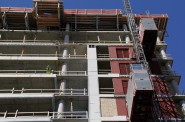State Falls Behind on Energy Conservation
Walker administration is years behind in enacting new energy conservation standards for buildings. Second in a series.
To Keith Reopelle, Wisconsin’s failure to revise its rules for new buildings to incorporate the latest advances in energy conservation is a huge mistake.
“People building new buildings are missing the benefits of efficiency improvements that the rest of the country is taking advantage of,” said Reopelle, who heads the nonprofit environmental group Clean Wisconsin. “We’ve stopped improving our buildings in terms of health and safety and efficiency.”

Ross DePaola, former chair of the state’s energy conservation code council, says Wisconsin’s failure to update this code puts it “in violation of the state statute.” Photo by Lauren Fuhrmann of Wisconsin Center for Investigative Journalism.
According to a U.S. Department of Energy website, Wisconsin’s energy conservation standards for new building construction are equivalent to 2009 international standards, which the state did not enact until September 2011. It has not yet enacted updated standards promulgated for 2012.
In a letter to Walker dated May 31, 2013, a deputy assistant secretary for the U.S. Department of Energy noted impending deadlines for updating these standards “to help taxpayers in Wisconsin achieve the cost savings associated with these energy efficiency measures.”
That drew a reply dated July 10, 2013, from Christopher Schoenherr, deputy secretary of the state Department of Administration. The letter said Wisconsin adopted the 2009 standards in 2011 and that its Department of Safety and Professional Services “reviews building codes every three to five years for possible updates.”
The International Energy Conservation Code is updated every three years. A state statute passed in 1993 requires the department to begin a review of this code as soon it is published, and submit proposed revisions to the Legislature within 18 months.
“They’re in violation of the state statute,” said Ross DePaola, a Madison-based energy efficiency consultant. DePaola served on the state’s energy conservation code council for more than a decade, representing Clean Wisconsin, and chaired the incarnation that passed the 2009 code. “All indications are that they haven’t worked on anything.”
The state’s energy conservation code council last met in 2009. Zillmer said this council could be revived, or its duties could be performed by other code councils. The 2015 code is now available for review.
DePaola said the state is missing out on its “one shot” — during construction — to take advantage of new products and practices that make buildings more energy efficient. He added that he has twice submitted applications to continue serving on this committee, should it be reconstituted, but received no reply.
“This is a consequence of reducing state government and saying we don’t like regulation,” DePaola said.
Bill Lueders is the Money and Politics Project director at the Wisconsin Center for Investigative Journalism (www.WisconsinWatch.org). The Center produces the project in partnership with MapLight.
The Center collaborates with Wisconsin Public Radio, Wisconsin Public Television, other news media and the UW-Madison School of Journalism and Mass Communication. All works created, published, posted or disseminated by the Center do not necessarily reflect the views or opinions of UW-Madison or any of its affiliates.
State Slips on Safety
-
Walker Administration Lets Building and Safety Codes Slip
 Sep 29th, 2014 by Bill Lueders
Sep 29th, 2014 by Bill Lueders





















Building codes are generally a bottom level design requirement for all builders to meet. If you have to letter grade out that code level of a newly constructed or major overhauled building that meets code, you would probably give it a D- as it pertains to energy efficiency. Most consumers assume in error that they are getting a highly efficient building because it is new. That is simply not true.
It is always “Buyer Beware” but a new owner may lack the knowledge of what it takes to achieve a high performance design and constructed building and grounds. Wisconsin has fallen in stock from a top ten state in energy efficiency and renewable energy as rated by ACEEE to middle of the pack compared to other states. Wisconsin is in a downward slide in most measurable categories and has the least educated governor and legislature that lacks any real ideas for a vision for a future unless it comes in the form of their corporate written laws from ALEC.